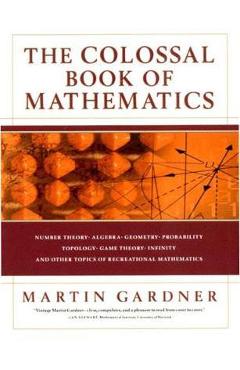
No amateur or math authority can be without this ultimate compendium of classic puzzles, paradoxes, and puzzles from Americas best-loved mathematical expert.
320 line drawings.
Whether discussing hexaflexagons or number theory, Klein bottles or the essence of nothing, Martin Gardner has single-handedly created the field of recreational mathematics.
The Colossal Book of Mathematics collects together Gardners most popular pieces from his legendary Mathematical Games column, which ran in Scientific American for twenty-five years.
Gardners array of absorbing puzzles and mind-twisting paradoxes opens mathematics up to the world at large, inspiring people to see past numbers and formulas and experience the application of mathematical principles to the mysterious world around them.
With articles on topics ranging from simple algebra to the twisting surfaces of Mobius strips, from an endless game of Bulgarian solitaire to the unreachable dream of time travel, this volume comprises a substantial and definitive monument to Gardners influence on mathematics, science, and culture.
In its twelve sections, The Colossal Book of Math explores a wide range of areas, each startlingly illuminated by Gardners incisive expertise.
Beginning with seemingly simple topics, Gardner expertly guides us through complicated and wondrous worlds: by way of basic algebra we contemplate the mesmerizing, often hilarious, linguistic and numerical possibilities of palindromes; using simple geometry, he dissects the principles of symmetry upon which the renowned mathematical artist M.
Escher constructs his unique, dizzying universe.
Gardner, like few thinkers today, melds a rigorous scientific skepticism with a profound artistic and imaginative impulse.
His stunning exploration of The Church of the Fourth Dimension, for example, bridges the disparate worlds of religion and science by brilliantly imagining the spatial possibility of Gods presence in the world as a fourth dimension, at once everywhere and nowhere.
With boundless wisdom and his trademark wit, Gardner allows the reader to further engage challenging topics like probability and game theory which have plagued clever gamblers, and famous mathematicians, for centuries.
Whether debunking Pascals wager with basic probability, making visual music with fractals, or uncoiling a knotted doughnut with introductory topology, Gardner continuously displays his fierce int.
Maria Miller
119.69 Lei
Alfred S. Posamentier
107.14 Lei
Eugenia Cheng
167.40 Lei
Michael Guillen
130.89 Lei
Maria Miller
116.90 Lei
Gerald J. Bierman
83.42 Lei